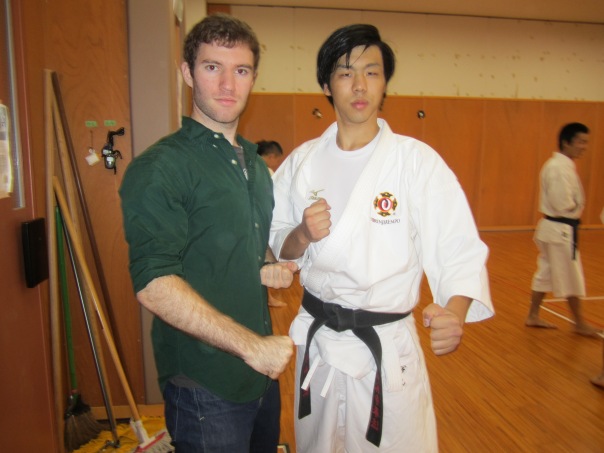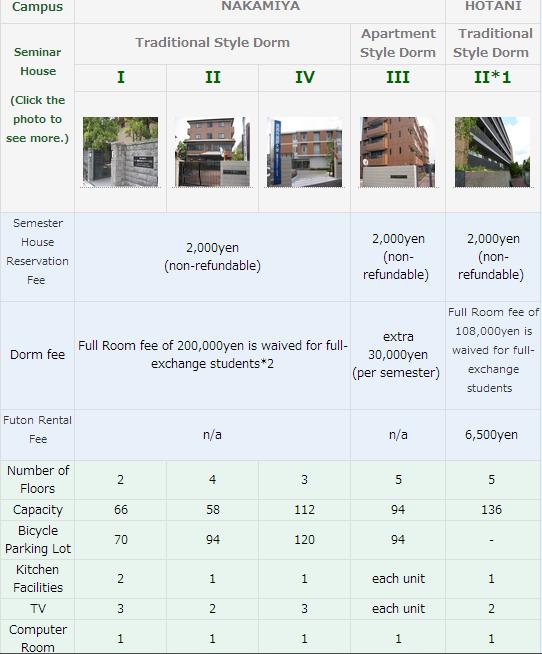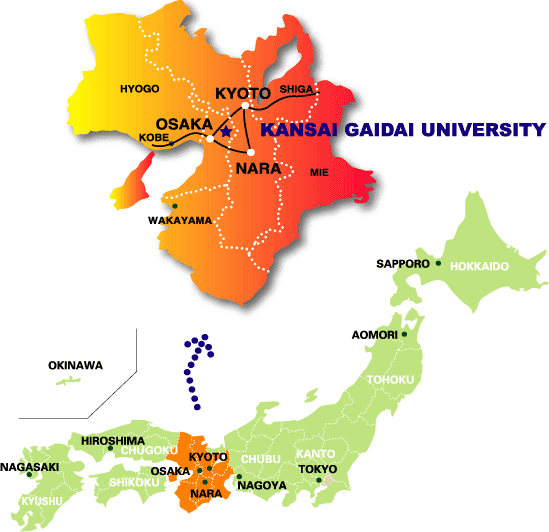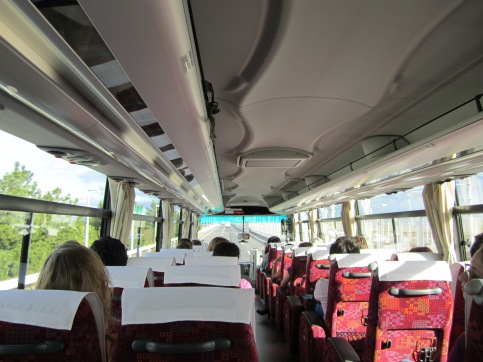Category Archives: College
Japanese and me, so far [part 4] (IS 6)

About two weeks into the semester at Kansai Gaidai, I found myself enrolled in a Shorinji Kempo martial arts club. The clubs in Japan are Read the rest of this entry
Japanese and me, so far [part 2] (IS 4)
From there I entered college with a drive to learn and to push myself. Having a desire to learn another language has become a driving force in my effort to learn Japanese and is incorporated into my major. I started off not truly knowing how to study Japanese and I would often spend most of my time staring at the pages of my textbooks, trying to absorb the information that way. This was horribly ineffective and after the first few chapters I started struggling. Most of the grammatical structures, vocabulary, and conjugations would make some sense for a day or so and then I would forget them or make the same errors again and again.
I was lucky enough to meet several Japanese exchange students right around the time when I was struggling most. They were very kind and started helping me practice my Japanese a few times a week. They would quiz me over and over again on vocabulary until I knew what they were going to say just by the first syllables that left their tongues. Once I was able to create my own sentences, not just repeat common phrases everyone had memorized, I would say anything and everything I could in Japanese to them, and I listened intently each time any of them spoke to me. I still struggled in class and my skills were poor all around, but I was still passing my courses at a level to continue. These people that helped me have become some of my best friends and I am still in contact with them today, driving me forward still.
I tried twice to go to Japan as an exchange student and had to cancel my application for abroad due to financial situations, caused by steep increases in the university’s fees up to $5,000 in one year. I tried for a third time and was able to study abroad in the Fall of 2012 at Kansai Gaidai University in Osaka, Japan. I was kept busy working throughout the summer, keeping me distracted for the most part from my studies, almost as if it was all a lie. Once I had let it sink in that I was accepted and the initial exhilaration had worn off, I started worrying about the different regional dialects of Japan, especially Osaka, where I was headed. I had heard from others that the dialect, known as a“-ben” in Japanese, in Osaka was particularly difficult and that words conjugated completely differently, nearly influencing a change in area of study. Yet the area was perfectly located; the university was in the middle of a triangle of absolutely beautiful cities, Osaka City, Nara, and Kyoto, all within about an hour or so by train. With this in mind, my motivation spiked once more and I set off for Japan.
Japanese and me, so far [part 1] (IS 3)
I lived in a city called West Palm Beach, Florida near Lake Okeechobee, until I was 12 years old. I was exposed to people from around the world that could speak a handful of different languages. The most dominant language besides English at the time was Spanish and I had picked up a bit just by being surrounded by it. If I drove about 30 minutes South, Spanish speaking skills were a must. I also took martial arts lessons, specifically Taekwondo, at a nearby dojang where the owners were half Korean and often taught the Korean terms for any moves, counting, being sure to keep a continuous blend of Korean and American culture. In middle school I moved to an area of NH where most people only spoke English and as such Spanish, French, and Latin were offered in the school systems starting in high school. I decided to go with Spanish, but had no real interest and did not challenge myself to learn the language as there was not anyone to speak with that was a native speaker or at least fluent in Spanish besides the instructor. There are many factors that play into how I have been learning the Japanese Language. The more prevalent aspects that affect me in my daily life in correlation to Japanese as a second language are known in linguistic anthropology terms as gender, expert, competence, gesture, community, humor, identity and evolution, yet the most important in my mind is motivation.
I have found motivation an elusive and difficult thing to find again and again. As far as a second language is concerned the process of learning often stems from some sort of driving force, to get you through the days where things are not working out, you feel like you are miles away from your goal and the only thing keeping you from quitting is some form of motivation. That can be an internal force or external. An excerpt from a journal article on motivational factors in consideration to Japanese specifically as a foreign or second language stated:
“…some motivational categories are quite exclusive to Second Language Acquisition; for example…‘communication’ as a driving force in learning a second language. MacNamara, and Lambert and Gardner’s integrative motivation refer to the fundamental nature of learning a foreign language as communicating with native speakers of the language, and as succeeding in becoming part of the community where the target language is spoken” (MATSUMOTO 60)
In this journal the focus is more on the continuation of learning and the motivation that keeps that interest in the subject for every step of the way, even after the academic, in-class level, of learning has passed. This strikes a key with me as I have never been naturally skilled or talented in the acquisition of languages. I often received poor scores on tests, quizzes and exams, yet I was always giving it my all. I could study for 5 hours straight, and get the same result or worse than someone else that studied for just one hour. An interesting thing about this article is that it is going against achievement theories; such as “you are successful so you gain the want to continue”, by saying:
“the learning of a foreign/second language involves far more than simply learning skills, or a system of rules, or a grammar; it involves an alteration in self-image, the adoption of new social and cultural behaviours and ways of being, and therefore has a significant impact on the social nature of the learner.” (MATSUMOTO 61)
This reasons that success in a second language goes beyond immediate grammatical, testable success, and melds the understanding of these rules with the changing of oneself at the same time. This is where my journey takes a turn for the hardest thing I have ever tried to do, and am still doing, learning Japanese.
When I was a freshman in high school I met an exchange student from Japan. He was in the same calculus course as me and he could speak basic English. He seemed like a nice person and I tried talk to him every day, yet he could not understand much of what I said and I had no knowledge of Japanese outside of “Konnichiha” and “Arigatou” which mean “good afternoon” and “thanks”. After about three weeks of failed attempts to communicate I decided that I would learn Japanese in order to help bridge the gap between us. I wandered haphazardly in my studies, picking up random words and a rough memorization of two of the Japanese writing scripts. Yet this did not help in my ability to speak in Japanese, yet he was improving rapidly with his English ability every day. This was my first motivation for learning Japanese.
Throughout high school I tried to get a Japanese language course integrated into the public school in order to study it in a formal setting with hopes of getting at least a few years worth of study. This went on for 3 years and then finally I had the chance from a grant offer by the state for new classes in public schools in New Hampshire. I was in charge of finding a Japanese instructor, students that shared a similar desire to learn Japanese, a time that worked for everyone to meet, and then to help decide how the class was to be graded. The class was hard and not structured very well, as the kind hearted instructor was used to teaching young children that had already spoken some Japanese and I was the only student to follow through with the class to the end. I had ended up learning mainly about the culture and a collection of interesting facts and the proper pronunciation of the Japanese syllabaries, but that was enough to get me started.
MATSUMOTO, MASANORI, and YASUKO OBANA. “MOTIVATIONAL FACTORS AND PERSISTENCE IN LEARNING JAPANESE AS A FOREIGN LANGUAGE.” New Zealand Journal of Asian Studies (2001): n. pag. New Zealand Journal of Asian Studies. June 2001. Web. 12 Apr. 2013. <http://www.nzasia.org.nz/downloads/NZJAS-June01/LearningJapanese.pdf>.
Host Vs. Home University Arrival Assistance (IS 2)
I have been talking with a lot of the Japanese exchange students at my home university and I have come to realize just how different the treatment of international students is between my home university and my host university in Japan.
About a month before heading to Kansai Gaidai University ( 関西外大 ) I received an email concerning where I wanted to live, how long I intended to stay and where, information relating to when I could apply for classes and most importantly information on how to get from the airport to the university. Housing was straight forward, listing all of the details of the five off campus, by a mile, Seminar Houses (similar to dorms) as well as the steps in requesting a home stay. I checked out the details and knew within two weeks where I would be living (seminar house 4). I gave a rough estimate of my housing dates, using my definite move in and a tenuous move out date. Housing: check. I found out that I would have to wait until physically arriving at Kansai Gaidai before I could choose anything. Classes: to be determined. Seeing as most of the exchange students heading to Gaidai have never been to Japan before, are unfamiliar with the area, or just outright do not know how to navigate Japan as of the first hour off the plane at Kansai International Airport, Kyoto Station and Osaka Itami Airport, the option of taking a group bus (for incoming international students only) to the Seminar Houses is available and recommended. Ride to Seminar House: check. There is a ¥2000 fee (roughly $24.00) for the bus, but the alternatives would be either a taxi, costing well over ¥5000 (~$60.00) or taking the train which ended up costing about ¥3000 (~$36.00). It was nice to have the choice to go directly to the Seminar Houses or to take our time exploring if we wanted to. Usually everyone is so excited to meet the people at the dorm, to set up their rooms and to see what the area is like, so they go straight to the dorm.
I checked out the details and knew within two weeks where I would be living (seminar house 4). I gave a rough estimate of my housing dates, using my definite move in and a tenuous move out date. Housing: check. I found out that I would have to wait until physically arriving at Kansai Gaidai before I could choose anything. Classes: to be determined. Seeing as most of the exchange students heading to Gaidai have never been to Japan before, are unfamiliar with the area, or just outright do not know how to navigate Japan as of the first hour off the plane at Kansai International Airport, Kyoto Station and Osaka Itami Airport, the option of taking a group bus (for incoming international students only) to the Seminar Houses is available and recommended. Ride to Seminar House: check. There is a ¥2000 fee (roughly $24.00) for the bus, but the alternatives would be either a taxi, costing well over ¥5000 (~$60.00) or taking the train which ended up costing about ¥3000 (~$36.00). It was nice to have the choice to go directly to the Seminar Houses or to take our time exploring if we wanted to. Usually everyone is so excited to meet the people at the dorm, to set up their rooms and to see what the area is like, so they go straight to the dorm.
For international exchange students coming to my home university the story is a little different. The students use the same system as the full time US students to register for classes and for housing. This site is confusing enough for native English speakers that have dealt with it in the past and heard the best ways to use it. The students are told to use the site and are on their own. What needs to happen to successfully apply for housing is;
- Request housing appointment
- Wait for authorized housing sign up date
- Search for available on campus housing
- Try not to get stuck in forced triples or quads
- Try not to end up in the smallest dorms on campus
- Select a room and wait to hear back from the university
Not the most enjoyable process. Once the students make their way to the USA they have to find their own way to the campus. There are recommendations for them on how to do so, but that usually goes as far as “we recommend you use either a Peterpan or Greyhound bus” and an address for the university. From there they are on their own. As for the students that arrive a few days early they need to look for hotels and make their way there by taxi. Housing: check, Transportation: Unknown.
That is saddening for me to hear. For me how I was treated every day played a large role in my absolutely loving my experience in Japan. I hope that any difficulties dealing with the university do not put a sour taste in anyone’s mouth. It might take a little more time and effort for the very busy staff, but to request a university bus to pick up the incoming students as an option would probably be a reasonable request.
Mission statement (IS 1)
This is my final semester as an Undergraduate student and I have decided to take a look back at my previous semester. I was studying abroad at 関西外大( 関西外国語大学 )Kansai Gaidai University in Osaka, Japan, located perfectly in the middle of the Osaka, Kyoto, Nara triangle, for four and a half mind blowing months. It is amazing just how fast time can go by; it feels like just last week I was camping on Makino Mountain with a few of my best friends and their family, eating yakitori and sukiyaki.
I will be making a series of blogs focusing on my experiences while in Japan, as well as my reactions after returning to the United States. There will be many comparisons between the USA and Japan in everything that caught my attention, ranging from nature and wildlife, the transportation systems, and view of foreigners. I will be incorporating a few stories of my more interesting encounters that left me in a state of bliss and at times confused beyond means. What more could anyone ask for out of achieving a life time goal?
If you happen to read this and think of any questions, comments, or topics that you would like me to go more in-depth with, please comment or message me.
“Why do we go to Japan?” [Study Abroad]

As I continue to plan my study abroad in Japan I am frequently asked a series of questions by both close friends and family, as well as by complete strangers. The main questions tend to be ” why do you study Japanese?”, “what interests you in Japan?” and of course the “why did you/ why will you be going to Japan?” One of my close friends that are also planning to go abroad to Japan found an article in The Japan Timesonline called “Why we came to Japan — a different realm” that really blew me away with a way to explain our decisions. If you know me and were wondering this, you are thinking about why you yourself would consider going to Japan, or if this is just something you would like to know, I recommend you read this.
In case the link does not work, I will paste a copy of this article by AMY CHAVEZ
“Why did you come to Japan?” We’ve all been asked this question. I still can’t give a good answer.
I certainly know why I came here, but such a point-blank question, usually from someone you hardy know, calls for an equal and reticent answer. Thus, we tend to say what we think our questioner wants to hear: “I came to work,” or “I came to teach English,” etc. But our reasons for coming to Japan are likely more profound. After all, most of us could have stayed in our own countries to work. Some of our predecessors came to fight wars, occupy and help rebuild. Others came seeking a better life. But my generation came to study, to teach, to experience or sometimes just to understand their own ancestors.
Some of us are running away from something at home: love, family, or responsibility. Some of us are the first in our family to ever go abroad. Others are living the life their parents only dreamed of. And some of us are doing nothing of the sort. But one thing is for sure: We came to Japan because we wanted to step into a different realm.
We were bright, we were young, we were full of wonder. We wanted to know: What’s out there? We wanted to step off the airplane and feel the first moonstones beneath our feet. And even now, when we go home, people ask us: What’s it like over there?
We came to Japan because we wanted to know what it’s like to walk down her streets, to feel the history of the samurai, or the sexiness of a geisha sashaying in geta. We came to have our photos taken in front of torii gates and temples and to seek the meaning of dragons, giant Buddhas and ancient Shinto ways.
And this we share with others who have been doing for centuries, just like my great grandfather did when he came to Japan. He purchased Japanese kimono for his two young daughters and when he returned to the U.S., he dressed them and took their photos. This brief, unlikely moment — of my grandmother and her sister as young girls, wearing kimono and holding a parasol between them — is indelible in my mind now because of this photo that hung on the wall in the house I grew up in.
And when we arrive in Japan, depending on our expectations, we either reach for the life jacket or we jump into the rescue boat. We either choose assisted swimming, or a complete return to safety. Some of us will be wowed by the country while others will be disappointed. Some of us will be fascinated and intrigued to the point of wanting to prolong the adventure, while others will prefer to retrace their steps, returning to security of home and family.
Those of us who are frustrated because we can’t find the right shampoo, that we can’t do even the simplest transaction at the bank, or who don’t like sucking up to their bosses, will go home soon. Those of us who are fascinated by all the different kinds of shampoo, and will buy even the last odd bottle on the shelf of the old ladies’ decrepit corner shop, will stay.
Those of us who have a taste for seafood appendages will stay while those repulsed by the same will leave. Those who see the language as a challenge to embrace will stay while those who fear the language barrier, unless they find an assistant, may leave. Those who fall in love will stay while those who don’t may leave.
But we all enjoy our stint living in Japan, a cradle of politeness. Politeness, so often a case of mistaken identity, is not the Please-Thank you kind of politeness, but culturally defined by roles, manuals and rigorous training. Walk into any restaurant and the Way of Politeness orchestra begins. Yet some of us will condemn this politeness for its lack of sincerity. Some will insist that a smile should be genuine. So some of us will go back to where we came from, where the people may be more rude, but they are sincere in their rudeness.
Others of us will understand that the fake politeness is exactly the point. We aren’t always polite because we want to be polite, but because we should be polite. If someone says something we disagree with, is it our duty to disagree? Or can we just quietly, politely, accept their views even though they are not our own?
When we learn Japanese, one of the first things we are told is not to use the word hate. It is too strong. And so it is, in any language. Yet in English it so freely rolls off the tongue: I hate fish! I hate school! I hate that guy! Can we be proud of hating something? Isn’t hate, rather, a sign of weakness?
Japan teaches us that there are many ways to act and react. And that we are not limited to our own. We are presented with a plethora of discernments we never thought we had before, notions of ganbaru (doing our best), shoganai (leaving some things to fate) and kawaii (cuteness). We are challenged by concepts long forgotten such as shyness, stoicism, and modesty. Some peculiarities we may never understand such as shrill female voices, obsession with character goods and the next TV tarento. Yet these are the moonstones we’ve stepped onto as we stepped into this other realm. You don’t have to choose them. But then again, you can.
We all had that curiosity — what’s out there?
So when we do go home, if we do go home, we are changed. That’s why we came to Japan.
OK, on to the next question, “How long stay Japan?”
introish
I had hoped to receive a few major scholarships but I have actually lost one that I have had for the last 3 years. Thankfully I have my 2 part-time jobs and I’m getting decent hours.
I have decided against a home-stay since I will only be in Japan for one semester and the time spent commuting back and forth to campus would be draining and I think I would miss out on a lot of opportunities. I look forward to meeting and getting to know the people from around the world in the Seminar houses of KGU. I still have so many unknown factors that will play into this but I am a cup half full kind of guy and I like to think that everything will work out in the end, especially if you have put everything you could into making it work.
As a Martial Artist I have been considering joining a martial arts club or circle at Kansai Gaidai. A club is very different at KGU than it is at UMass. I have heard that clubs in Japan are more like the USA university varsity teams as they have 3 hour practices, 6 days a week. While “circles” in Japan are more like our clubs, meeting up several times a week but not as often or as intensely as the clubs do.
I am also concerned with my Japanese levels as I think that my listening and comprehension skills are the most lacking, I will likely need that the most. Who know’s, one step at a time.
Study Abroad: Japan
I just received my Official Certificate of Eligibility for study abroad in Japan at Kansai Gaidai University (関西外国語大学). This is the third time I am trying to study abroad in college and so far something has come up or changed to make it so I was unable to go. At the moment I have several challenges in front of me before I can call this definite but I have put everything on the line for this to work. I have purchased round trip plane tickets through United Airlines, I have withdrawn from my UMass dorm, been removed from UMass courses, and there is no turning back now. I am so happy that I am actually following through with this, but it is not without it’s risks.
realization and desire; my plan

When I was 4 years old I started training in TaeKwonDo in Florida. I continued for several years, entering in dozens of competitions along the way, traveling, meeting new people, and having amazing experiences. Then I moved to NH and went a few years before I felt a longing to get back into the martial arts world. I then moved to Kajukenpo and Pai lum kung fu, training in those styles for a few years and then injured myself, bringing my training to a sudden halt for about 2 years. Then switching back to Taekwondo after I had healed enough to train and getting my car so I could drive myself longer distances without relying on my parents. Once I entered college I continued practicing TaeKwonDo more and more and eventually entered my first collegiate competition.
Let’s just say it wasn’t my best set of results. But at the same time I loved it, it didn’t matter if I had won or lost, it was about pushing myself and seeing what I was capable of, as well as what others were capable of. From there I could see just how much work I needed to do to compete at their levels. I was having an amazing time while balancing coursework, a part time job, friends, and TKD. At the second competition I was leaner, faster, stronger, and smarter in the ways of competition fighting. I still had a long way to go before I would be able to compete with the highest ranking competitors from universities and colleges like Harvard, MIT, NYU, UCLA and more, but I was starting to hold my own. Saddly that was my last competition at the collegiate level since, I just finished my Junior year in college and I have recently come into contact with the people I had trained under as well as the people I trained with in Florida as a small kid.
Since talking with everyone I have realized that I could do so much more, push myself so much farther, but only if I was the one who truly wanted to, if I was going to push, if I was going to dedicate my whole self into this. There is no changing the past, and no use in wishing you had done something differently, there is only now, and the future that can be changed, but I will not let go of my past.
I have decided to dedicate myself to training every day in order to compete on the national level for TaeKwonDo. I will not, cannot, slack off. I will eat healthier, go distance running, body-weight train, possibly weight-train, bike to and from work (6 or so miles each way), and most importantly I will practice TaeKwonDo every day.
My goals to reach are as follows;
-win a local TKD Tournament
-run a 5K
-be in great health/ shape
-compete in nationals
-maybe more to come later
This will not be easy and I will not pretend that it will be. Yet that does not change the fact that I will give this everything I have.
College Apocalypse; 2012
 It is 2012 and the end of the world as we knew it has commenced. A Neuro–virus has been released onto the majority of the students here at UMass. The fire sprinkler systems were broken into, the Neuro-virus added and then, at the peak of the day, they were all set off simultaneously, effectively drenching the unexpecting and quickly irritated students. The virus seeped into the body through cuts, scrapes, eyes and even the pores if left on the skin long enough. All thanks to a junior writing professor and his whimsical mind and sporadic distaste for monotony, a few others and myself ended up outside, sitting on the steps of the Campus Center when this all occurred. This spared us from the almost instantaneous Zombification process that occurred once the N-virus reached your blood system.
It is 2012 and the end of the world as we knew it has commenced. A Neuro–virus has been released onto the majority of the students here at UMass. The fire sprinkler systems were broken into, the Neuro-virus added and then, at the peak of the day, they were all set off simultaneously, effectively drenching the unexpecting and quickly irritated students. The virus seeped into the body through cuts, scrapes, eyes and even the pores if left on the skin long enough. All thanks to a junior writing professor and his whimsical mind and sporadic distaste for monotony, a few others and myself ended up outside, sitting on the steps of the Campus Center when this all occurred. This spared us from the almost instantaneous Zombification process that occurred once the N-virus reached your blood system.
Now what?


